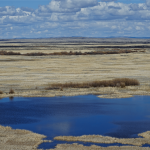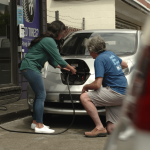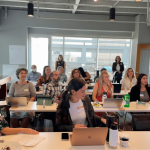Oregon Environmental Council’s voting guide for 2018 ballot measures

At Oregon Environmental Council, we believe civic engagement is important. Just as important as supporting healthy communities for Oregon’s future. That’s why we’re taking a stand on these important ballot measures for the 2018 election.
Don’t forget to vote on NOVEMBER 6, 2018!
NO ON MEASURE 103
This constitutional amendment would permanently block taxes on so-called “groceries” and is so broadly written that it would exempt a wide range of transactions (e.g., food processing, trucking, fast food chains) from any taxes or fees. As one example, it would prohibit collecting the weight mile tax or gasoline tax when a vehicle is carrying “groceries.” And it could undermine attempts to reduce greenhouse gas emissions associated with the transportation of “groceries.” This constitutional amendment is unprecedented and unnecessary.
Vote NO on Constitutional Amendment 103!
NO ON MEASURE 104
This constitutional amendment would expand, beyond taxes, the legislature’s three-fifths supermajority requirement to fees of all kinds. This would further cripple the state’s budget, including the ability of natural resources to protect our health and environment. As examples, the Department of Environmental Quality wouldn’t be able to hold polluters accountable through Cleaner Air Oregon, or assess appropriate fees on hazardous waste generators, or collect fees on vessels to be prepared for oil spills. The Oregon Health Authority wouldn’t be able to implement the Toxic-Free Kids Act.
Vote NO on Constitutional Amendment 104!
NO ON MEASURE 105
Measure 105 would repeal an Oregon law that protects immigrants and refugees from federal immigration laws that enforce unjust treatment and racial profiling. The xenophobic proponents of Measure 105 have been preying on fears of water scarcity, pollution and global warming to promote anti-immigrant actions like this one. To the contrary, passage of Measure 105 would actually undermine environmental progress by diverting police and taxpayer dollars away from community safety, including environmental safety. It is the environmental community’s responsibility to stand up for immigrants and refugees who are often most affected by environmental injustice, such as exposures to pesticides and the impacts of climate change. Learn more at Oregonians United Against Profiling.
Vote NO on Measure 105!
YES ON PORTLAND CLEAN ENERGY FUND
The Portland Clean Energy Fund will build a just and clean energy future for all Portlanders, generating approximately $30 million a year in new revenue for nonprofit-led energy efficiency upgrades, home weatherization, rooftop solar, job training, local food production, and green infrastructure. It will address social and economic inequity by providing major new economic opportunities for low-income Portlanders, including women and communities of color.
The funding will come from a 1% business license surcharge on billion dollar retail corporations in Portland. Learn more at The Portland Clean Energy Fund.
Vote YES in November!
YES ON AFFORDABLE HOUSING
Measure 102 will lift the current ban on the ability of local governments to work with nonprofits and local businesses to build affordable housing in their community with bond funds. In the Portland metro area, voters will have the opportunity to approve a regional bond for affordable housing. A lack of affordable housing undermines environmental and equity goals. Affordable housing will reduce greenhouse gas emissions from transportation by helping low-income residents live in areas served by transit, sidewalks and bikeways. Affordable housing will give renters options to avoid sub-standard environmental conditions such as lead, harmful chemicals, pests and mold, and poor indoor air quality. Affordable housing will reduce pressure to undermine the state’s land use planning laws. Learn more about the two measures at Yes for Affordable Housing.
Vote YES for affordable housing in November!











Rick Alexander
August 23, 2018 (5:25 pm)
Groceries should not be taxed. And, taxes and fees proposed by state legislatirs should be required to be voted on by citizens and still must achieve a supermajority of legislative votes. Any other fee or tax assessment is unconstitutional according to Oregon’s Constitution and Oregon voters have already said no more taxes.
What we need to Constitutionally remove from the Oregon State Legislature is the emergency clause option. That should never have been a thing, even.
Lee
September 20, 2018 (12:18 am)
This measure has nothing to do with groceries…and everything to do with soda pop and other sugar based drinks….that is the industry that mounted this campaign and wants you to think food is in danger of being taxed. It isn’t. .
Becky
September 25, 2018 (9:15 pm)
What”s the bottom line here? Will the price of food go up more that it has with “normal” inflation?
One person says yes, one says no?
Your saying only sugar filled drinks will go up in price? What about my fizzy bubbly water?
shauna
October 24, 2018 (3:38 pm)
Fizzy bubbly water isn’t food. Your body is trying hard to get rid of CO2 and drinking it hardens and locks waste proteins in your body. The real issue is combating the environmental damage from trucking groceries which should be done directly instead of taxing the groceries. The bill doesn’t address this so until we can nail the real problem I am going to vote no so that I won’t be subsidizing the transport of junk food and everyone’s medical needs because of their eating habits.
Lloyd
November 3, 2018 (12:05 am)
Voting “No” on measure 103 ensure the possibility that you very well could be subsidizing the things you just said you’re against. Because if a tax is passed, you will ultimately bear the cost every time you go shopping for groceries….thus subsidizing it…
No to Fear, No to Measure 105 | Oregon Environmental Council
September 30, 2018 (5:38 pm)
[…] values are about care and respect for people and places. That’s why we are so firmly against ballot Measure 105: because intolerance and hostility undermine environmental solutions. We also reject the tactics […]
NAOMI BLOOM
October 26, 2018 (9:32 pm)
Why not NO on 106?
Admin
October 29, 2018 (4:29 pm)
Hi Naomi, thank you for your comment on our ballot measure post. Oregon Environmental Council only takes positions on ballot measures that are directly related to or have significant impacts on our strategic goals. While Measure 106 is an important issue it simply isn’t one that falls into our realm of work